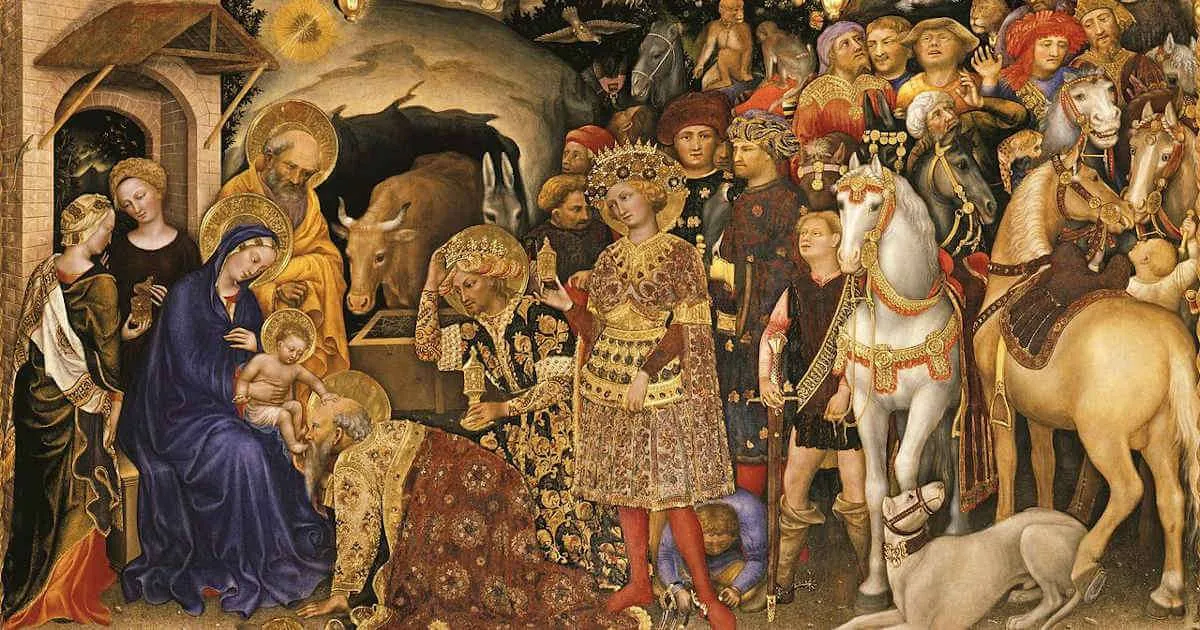“Everyone is upset about this.” “Everyone agrees with this.” “Everyone says we should do it this way.” If you’re in any position of leadership, you have probably heard someone tell you something like this. Anytime I hear it, it’s all I can do to keep from rolling my eyes! The idea, of course, is that there is strength in numbers, and if you’re making an argument, it sounds like it has more weight if you can claim “everyone” has the same opinion. This is the logical fallacy called “argumentum ad populem,” and it’s a telltale sign of insecurity.
I thought of this as I was reading today’s Gospel reading. It says that Herod, hearing about the Christ child from the magi, was troubled, “and all Jerusalem with him.” Clearly, most of Jerusalem didn’t even know about the magi, or how Herod was feeling, or even about the Christ child perhaps, so it’s a bit of a stretch to think that “all Jerusalem” was troubled. But clearly Herod was, and in his insecurity, he made many mistakes, the least of which was claiming that all of Jerusalem was troubled with him.
Herod was a jealous and insecure man. His authority rested on the good will of the Roman government, and he was always on the lookout for those who would usurp his throne. The truth was, his throne wasn’t all that big a deal to begin with. Jerusalem wasn’t that important in the grand Roman scheme of things, but well, it was his. Three visitors from afar were bad enough to get him feeling uneasy, but when they came asking for the newborn king of the Jews, Herod was furious with jealousy. He was indeed “greatly troubled” and all Jerusalem – at least all the nobility, the ones who mattered to him – were troubled with him. He put into motion several schemes to defend his position. He interrogated the visitors, he put the scribes and chief priests on the case, he even eventually had all the boys less than two years old murdered. He turned out to be a rather pathetic and miserable king.
See, darkness covers the earth,
and thick clouds cover the peoples.
Herod’s story is not indicative of anything close to the Christmas spirit. But insecure leaders do crazy things and cause a lot of darkness over their corners of the earth. And insecure leaders don’t have to be kings. They could be teachers, managers, parents, priests. Insecurity can cause a whole lot of strife, and we’re all capable of darkening the world with it.
To those of us who have had to deal with this kind of feeling, or perhaps are still dealing with it, Isaiah’s words today provide the best comfort we can hope for:
But upon you the LORD shines,
and over you appears his glory.
Out of the darkness that sometimes permeates our lives and our world, God’s light appears. Maybe this doesn’t seem like much comfort to those who are suffering in darkness, but here is what we need to hear: God created light out of nothing at all. The universe was awash in darkness and chaos, but out of that, God brought order and light and everything that exists. Every light that we see: stars, moon, sun, love, grace, forgiveness, and all the rest; all of these have been created by God and are ways that the Lord shines upon us.
Today we celebrate the Solemnity of the Epiphany. An epiphany is a divine revelation into the world of humanity. It’s God doing a God-thing. An epiphany is when God breaks through all the mundaneness of our human condition and destroys the insecurities we feel and the limitations of our fallen world and makes his presence known among us. On this feast of the Epiphany of the Lord, we celebrate our Lord revealing his light to those of us who spend a lot of time observing the darkness.
Wherever you may find yourself on the darkness spectrum right now, the Epiphany of the Lord can be your redemption. Indeed, the Epiphany celebrates that God’s light brings radical transformation. It’s not the paltry comfort of a pat on the back and a “there-there.” It’s not the relatively small comfort of the resolution of all your problems. It’s instead the great opulence of brightly-shining gold and the rich fragrance of the most precious incense. Isaiah says it will be like this:
Then you shall be radiant at what you see,
your heart shall throb and overflow,
for the riches of the sea will be emptied out before you,
the wealth of the nations shall be brought to you.
In the darkness of the created world two millennia ago, magi from the east observed a star rising in the eastern sky. That bright star guided them to the place where they found the newborn king of the Jews. The brightness of that star was nothing compared to the brightness that came into the world with that tiny Child. In Him, God revealed himself as a loving, compassionate God who does not just observe his creation from afar, but rather breaks into our world, takes on our human condition, and redeems us from the inside out. God obliterates our insecurities and replaces them with hope and grace and mercy. The Epiphany takes hold of the world in the glory of the Incarnation, and that Incarnation reaches its fulfillment in the Paschal Mystery. Christ comes to take on our human form, wipe away our sins, and bring us back to the glory of God for which we were created. The Epiphany is a radical transformation of our world and our lives – for the better.
May this new year find us watching for our rising star, and finding light for our darkness in Jesus Christ, the light of the world. May we all find God’s Epiphany in every place we look.
